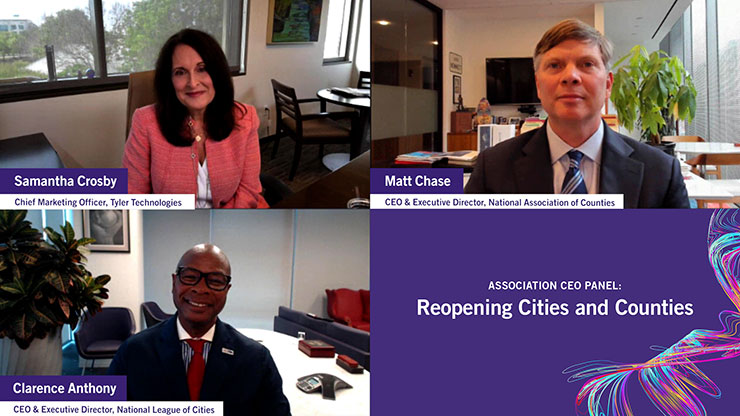A Conversation With Associations
April 28, 2021 by Meredith Trimble
A Panel with NLC CEO Clarence Anthony and NACo Executive Director Matt Chase

Public sector industry associations work tirelessly to support thriving cities and counties. It’s a powerful thing when these organizations align and connect with each other and industry partners. These connections truly move the needle in tackling public health and reopening challenges as well as issues such as natural disasters, political uncertainty, an evolving cyberthreat landscape, a changing workforce, and more.
In this exceptional conversation, Clarence Anthony, National League of Cities (NLC) CEO, and Matt Chase, National Association of Counties executive director, shared their insight and vision on how 2021 can be one of positive transformation.

Moderator Samantha Crosby, chief marketing officer of Tyler Technologies, first invited the executives to provide an overview of their organizations and speak to how their associations directly impact the work of city and county professionals.
“The National League of Cities is the voice for all cities, towns, and villages throughout America,” Anthony said. He described NLC’s role as their lobbyist in Washington, D.C., and also explained the importance of NLC’s connections with the private sector, such as Tyler Technologies, to foster “a partnership between the ideas of our membership and what they’re going through and the solutions to help address their challenges.”
NACo represents America’s more than 3,000 county governments including parishes and boroughs. “Our role is to be their voice here in Washington as part of the intergovernmental system between federal, state, local, and tribal elected officials,” Chase explained, clarifying that NACo is not a special interest group, rather a governmental partner. “One of NACo’s emerging strengths,” he continued, “is harnessing the expertise of the county workforce along with our private sector partners to test and scale innovative solutions.” It is often the case that those micro solutions are just as important as the bigger ideas, helping to lead the country from the grassroots up.
Following are just a few highlights from the valuable, insightful discussion that followed:
- On advocacy efforts around relief:
“We know the pulse of the local community. We knew what was happening in local government, so we engaged with every staff level in local government, even the data officers and the chief financial officers, to make sure that we were telling the story of the impact.”
— Clarence Anthony
“We wanted to stress that it wasn’t just about revenue, it was about meeting the demands of every community. Some cities and counties were doing OK with the revenue, others were devastated. But the demands side of our balance sheet — the expense side, the citizen and resident needs side — was never really talked about until we forcefully pushed the conversation… We talked about counties and cities as institutions and levels of government but also levels of a community. If you could get money to city and county governments, you would ensure that every square inch of the country received some level of federal aid.”
— Matt Chase
- On American Rescue Plan Act fund use:
“We stress with our members the importance of investing this money, not spending it. This is a once-in-a-generation opportunity…We’re encouraging our members to develop a strategic plan, listen to the community, and to focus on the long-term building blocks that we need for the country.”
— Matt Chase
“Get a recovery plan in place so when the dollars do come, you’re not caught off guard. Do a needs assessment…The pandemic has made us see the gaps, based on data, that exist in our communities…It’s all about data and putting together a plan.”
— Clarence Anthony
- On equity and access:
“So many things have shown us that we need to deal with this issue now. The National League of Cities has been dealing with the issue of racial equity for over six years. We created a program at that time called Race Equity and Leadership (REAL) and what we found was that we had not had the real conversations and not gotten the data — not tracked the investments in our nation and in our cities and towns and villages — and we needed to do that…What we focused on was getting education and training so that when these issues come up, our city leaders will have the tools to address them.”
— Clarence Anthony
“For NACo and counties, equity is the top of the list. What we’re seeing is a dual focus…when county commissioners take action, we’re now seeing them institute their own think tanks or their own policy lens to look at what is the equity impact of the county decision-making…Number two is counties as employers…We’re seeing counties revisit their Diversity, Equity, and Inclusion initiatives as an employer… We expend considerable energy on looking at who are our consumers of our services and are we treating them in a silo versus bringing a comprehensive approach to their care.”
— Matt Chase
- On the promise of data at a local level:
“We love data, we want to incentivize data, because the data gives you space to have tough conversations. Going back to the equity issue, data is a great way to be a conversation starter and to provide a neutral forum.”
— Matt Chase
“Data is essential. As a former mayor, sometimes the emotions of decisions take away from what the data is actually saying. If we really want to find out what kind of impact our work is having on communities, we must be able to measure that impact.”
— Clarence Anthony
- On civic engagement:
“Local governments have had to use virtual tools to create transparency and get input. They have to figure out a way to keep engaging their residents using social media or virtual governance and online options, where young people have become more interested in how their government works…We also have to reach out to communities that don’t have access to this technology to make sure that we hear their voice.”
— Clarence Anthony
“There’s nothing more important than public trust. Our form of government relies on a certain level of public trust, and with trust, hopefully the engagement will also improve. So, when we talk about civic engagement, I would also add on the importance of civility and civic education. Technology is so important…The more you can meet [resident] expectations where they’re at not where the city hall or the county courthouse is, then we can start building public trust.”
— Matt Chase
In conclusion, the panel discussed the important intersection between policy and technology, and the fact that such intersectionality will be a long-term discussion. Chase noted that technology must focus on the end user experience, and that, “if it’s saving time and frustration for the end user, the money will follow it.” Anthony posed a challenge to Connect attendees to “step up to the table” and give NLC the solutions and ideas that will help address their concerns.